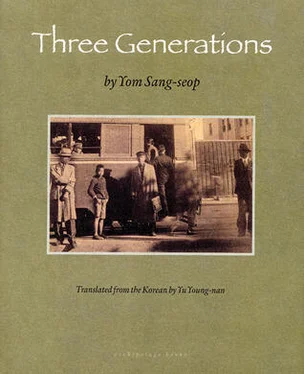“There you go again, toying with people.” She turned toward Ui-gyeong. “Make sure you hold on to him tight. He often pretends he’s crazy when he does something stupid. Both you and I ended up like this out of bad luck, but you should live well, with no regrets and a strong heart.” She spoke earnestly, as if she were Sang-hun’s lawful wife.
Ui-gyeong pinned her hair up.
Gyeong-ae addressed Sang-hun, “Look at your gray hair in the mirror. You’re not getting any younger. Besides, whenever you spend money, it doesn’t just disappear. It comes back to you with the curses of others. Don’t you know that if you spend a hundred won, you earn a hundred curses, and if you spend a thousand won, you earn a thousand curses? Are you planning to go to the gates of Paradise and beg God to pull you up?”
“Will he even be able to make it that far when his sins are so heavy?” Ui-gyeong cut in, and they laughed together.
Sang-hun was miffed. Gyeong-ae’s attitude didn’t permit serious talk of any kind. I’d better give her up, he resolved. The more firmly he tried to cling to his decision, however, the more alluring he found her.
Ui-gyeong did nothing all day except eat, change clothes, and buy whatever frivolous thing that caught her fancy. When her indulgences were denied, her irritation was unremitting, and she took a sharp tone all day long. Sang-hun knew his interest in her would wane. Gyeong-ae, on the other hand, who was mature enough to supervise a household, seemed right for him, especially now that he was older. He sensed, though, that she belonged to someone else.
“Why was Byeong-hwa taken to the police yesterday?” Sang-hun finally managed to ask.
“Why are you so concerned about other people?” Gyeong-ae couldn’t stand to hear Byeong-hwa’s name uttered by Sang-hun. “Are you in any position to worry about others?”
“I’m not worrying about others. I’m just not sure whether someone is dragging him down or he’s dragging someone down with him. Either way, they’ll be in a hell of a mess one of these days.”
“It’s not that simple. But you know I could take over the shop fully if I return his money and send him away.”
“How much do you need?” Sang-hun perked up.
Ui-gyeong blinked her eyes several times.
“Between twenty-five hundred and three thousand won.”
Gyeong-ae and Sang-hun spoke no more.
The maidservant brought in a meal tray set for two.
“I haven’t even washed my face yet. What’s the hurry?”
As Gyeong-ae was about to leave, he asked her to stay, saying that the two women should eat together, that he’d eat later.
“Don’t you think someone will pout if I eat a meal reserved for the two of you?” Gyeong-ae was saying when the gate of the outer quarters rattled.
The maid went out to open it. Like an evangelical woman, Gyeong-ae’s mother held a black velvet bag, and a purple wool scarf covered her face up to her nose. The mother and daughter were startled to see each other, and Sang-hun looked on with an awkward smile.
Gyeong-ae tried to hasten her mother’s departure to prevent her from making a scene. If Sang-hun were provoked, he’d lose face and would likely change his mind about giving Gyeong-ae the money.
Despite Gyeong-ae’s calming efforts, the older woman poured out a stream of complaints and railed that if Sang-hun was unwilling to take in Gyeong-ae and his child, he’d better provide them with enough to last their lifetime. Otherwise, she’d drag him to court.
“I’ve heard of people sueing their own children, so what can prevent me from taking him to court, Gyeong-ae? Why are you following this lowlife around like a spineless fool? Are there no other men left in the world?”
Sang-hun was shocked; since when had this gentle woman’s mouth begun to spew such venom? Yet, he had to admit that he had also changed considerably since their church days.
There was a rumor going around that if Deok-gi didn’t quietly hand the rice refinery over to his father, Sang-hun would bring a lawsuit against his own son. The spinners of this rumor were Chang-hun and Clerk Choe; they felt there was nothing to gain from loyalty to Deok-gi, who lived by the book. When they sensed that Sang-hun was disgruntled at the frosty treatment he had received during the funeral, they whipped up the story, both to egg Sang-hun on and to flatter him. While they were at it, they also insinuated that Deok-gi should give up the house where he lived. They couldn’t touch the rice paddies and fields because the old man had transferred the deeds to Deok-gi, but the big house still had the same owner; the grandfather had merely written in the will that Deok-gi should stay there. If Sang-hun, the inheritor in the eyes of the law, claimed the house as his own, he might well be able to obtain it.
Gyeong-ae’s mother hadn’t meant to unleash such an outpouring of invective, but the sight of Ui-gyeong made her blood boil and her maternal instincts took over. Back in the street, she immediately regretted the outburst and tried to persuade her daughter to remain on Sang-hun’s good side. “I said what I said, but how can we cut ties with him when there’s your child to think of? That young thing he’s fooling around with — it can’t last long, can it?”
Gyeong-ae stared at her mother in profound disbelief.
Later that day, Deok-gi’s mother stormed out of her house, asking the servant to pack up the furniture and appliances and send them to the big house. Her husband was defying all decency and speaking with him was like reading a Buddhist scripture to an ox. She couldn’t stand the sight of the tarts — young and old — who flocked to her house at the crack of dawn, turning it into a marketplace. Although Sang-hun did what he could to ignore the commotion, his wife’s relocation to the big house provided no great relief.
It was noisy for a while, with Deok-gi coming and going, but two days later, the mother and daughter had moved. Won-sam and his wife didn’t feel like staying on, and when Maedang asked them to vacate the servants’ quarters to make room for her people, they jumped at the chance and found a rented room near Hyoja-dong with the thought of helping out at Sanhaejin.
The Suwon woman gave up the main room when Deok-gi’s mother arrived with her furnishings, but she tried to hold her ground for the sake of appearances, saying that she could leave only after three years’ mourning. Before long, though, she said she wouldn’t mind going as long as they kept a room ready for her, even if they needed to keep her things in storage. She then went to Hwagae-dong, the house in which her “niece,” Ui-gyeong, was now settling. She no longer bickered with Sang-hun or concealed anything from him. Sang-hun, for his part, got along with her well enough, perhaps because of their shared resentment for Deok-gi.
Maedang was charged up, as if she were helping her own daughter set up house. Flanked by the sisterhood, she made a majestic entrance even before the lawful wife’s furniture had moved an inch. Maedang’s contribution to the new household amounted to nothing more than a box of matches, but after ripping apart the house, she was enthroned in the main room and took control of everything. Accustomed to living well, she had in mind a complete list of essentials for a household, all of which materialized as soon as she gave the word. Chang-hun and Clerk Choe were her devoted runners. Regularly furnishing houses for her adopted kin, she was a seasoned hand, and so was Clerk Choe by now. Shops on Jongno supplied the items on Maedang’s wishlist without hesitation.
This woman’s credo was “buy the very best, for money is no object.” The buyer naturally thinks this way when paying with someone else’s money, but this woman’s credibility and prowess were held in high esteem by the tradesmen; she paid in full, without haggling, as soon as they delivered her order.
Читать дальше












